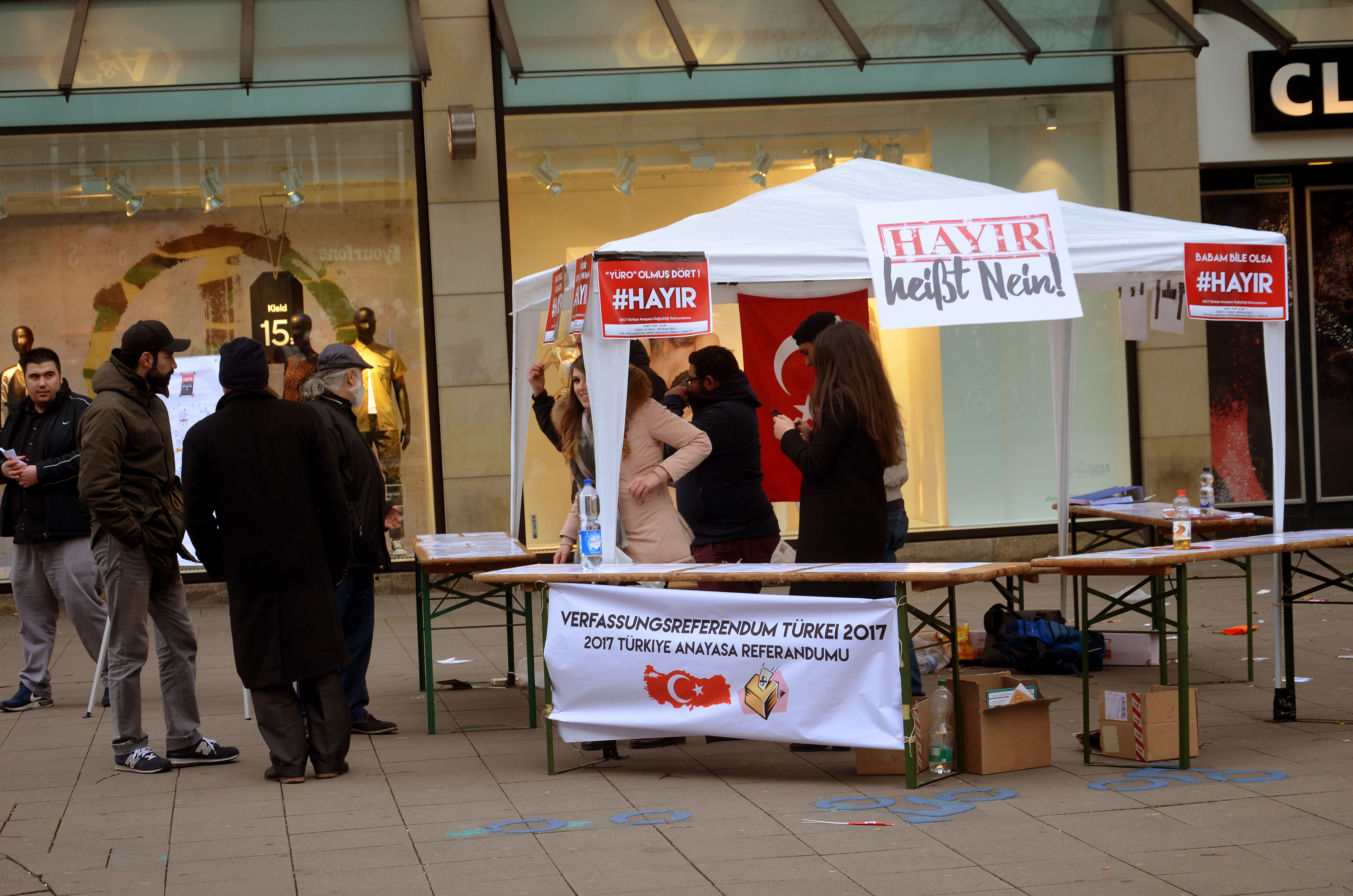In Turkey, voting for the country’s crucial constitutional referendum will take place on April 16, 2017. President Erdoğan is hoping for a resounding Evet (Yes) vote in order to transform Turkey into a presidential republic and to enhance the powers of his office. In Germany, 1.4 million German Turks holding a Turkish passport were already able to vote between March 27 and April 9 in consulates and 13 polling stations around the country.
German Turks as a critical constituency
As opinion polls in Turkey have tightened, German Turks have become a crucial factor in the election, potentially able to tip the scales either way. Consequently, AKP politicians have spent considerable energy on trying to mobilise Turkish voters in Germany in favour of the presidential system.
The German government and local administrations proceeded to prohibit several campaign speeches by Turkish ministers. None of these events had diplomatic consequences as severe as the Netherlands’ expulsion of the Turkish Minister for Family Affairs shortly before the Dutch election.1 Nevertheless, the Turkish leadership has not openly accused German authorities of fascist practices and of seeking to weaken Turkey by preventing a Yes-vote in the referendum.
Belated organisation of the No campaign
Compared to the Evet camp, their Hayır (No) opponents, have tended to organise late in Germany. Fears of potential repercussions of an open anti-Erdoğan stance appear to have played a role in this.
In recent weeks, German media have reported on extensive intelligence and spying operations of the Turkish secret service, MİT. The agency has a strong presence in Germany with reportedly 400 full-time employees. Observers noted MİT’s attempt to spread a “climate of fear” among Turkish dissidents in Germany – Kurds, Gülenists, Kemalists, and leftists alike.2
At first sight, the German Turkish vote appears Erdoğan’s vote to lose: In 2015’s parliamentary elections, 60 per cent of German Turks opted for the AKP. However, less than 50 per cent of those eligible to vote actually cast a ballot, leaving a considerable marge of uncertainty over the actual allegiances of the community.3
A loyalty questioned
Against the backdrop of this uncertainty, the outcome of the referendum among German Turks seems just as unforeseeable as the overall referendum result. What is certain, however, is that the Turks and people of Turkish heritage living in Germany have been placed in a real bind. As relations between Berlin and Ankara have soured, their loyalty to Germany has been questioned time and again.
What is more, on the conservative side of the political spectrum there have been repeated attempts to roll back dual citizenship provisions, with the aim of forcing German Turks to choose between their allegiance to Turkey or to Germany.
Europe and Germany as the villain
With the Turkish President – the strongman and thus the very embodiment of the Turkish nation to many of his supporters – receiving unprecedented opprobrium in much of mainstream German political and media discourses, some German Turks have shifted to a more pro-Erdoğan position.
Many young attendees at a loyalist rally led by Turkish Foreign Minister Mevlüt Çavuşoğlu evoked feelings of indignation at what they perceived to be a humiliation of Turkey in the German press. More generally, many of them asserted that the restrictions placed on Turkish politicians’ speeches showed that Germany was not a true democracy and that freedom of speech was systematically limited to their detriment.4
This line is also held by the Union of European Turkish Democrats (UETD), a pro-AKP lobbying organisation active in Turkish communities across Europe. Its chairman Zafer Sırakaya asserted that “at the moment in Germany freedom of opinion and freedom of assembly only apply to the opponents of the constitutional reform”.5
Taking a stand against dictatorship in Turkey
Conversely, the largest ethnically Turkish association in Germany, Türkische Gemeinde in Deutschland (TGD), has become a vocal critic of Erdoğan since 2013 and openly supports the No campaign.6. The association, together with a number of German Turkish politicians, also published a manifesto calling for a No vote and declaring solidarity with oppressed groups in Turkey.7
These sentiments are echoed in the statements of many of those German Turks willing to speak about their objections to the presidential system and Erdoğan’s quest for power to the media (although some only do so on condition of anonymity).8
Feridun Zaimoğlu, writer and public intellectual captured an oft-voiced argument when he stated that “as a Turk or German Turk one cannot benefit from freedom in Germany and then vote for the unfreedom of Turkey. Whoever does that is a coward. And sick.”9
A community divided
Yet the sentiment perhaps most widely expressed by German Turks is a sentiment of regret. They perceive the diplomatic rows as a threat to their position in Germany. The stance on President Erdoğan and his constitutional referendum has become to many a choice between Turkey and Germany.
This choice also divides friends and family, with close family members breaking off contact or insulting each other as ‘traitors’.10 How these divisions could be healed in the future is anybody’s guess.
Sources
https://www.theguardian.com/world/2017/mar/11/erdogan-brands-dutch-nazi-remnants-for-barring-turkish-mp ↩
http://www.dw.com/de/geheimdienstexperte-t%C3%BCrkei-sch%C3%BCrt-ein-klima-der-angst/a-38158666?maca=de-domschule-de-pol-we-eur-1200-rdf ↩
http://www.faz.net/aktuell/politik/inland/deutschtuerken-gegen-erdogans-referendum-14928470-p2.html?printPagedArticle=true#pageIndex_2 ↩
http://www.jetzt.de/politik/deutschtuerken-wie-denken-sie-ueber-erdogan-und-die-deutsche-politik ↩
http://uetd.org/meinungs-und-versammlungsfreiheit-haben-nur-gegner-der-tuerkischen-verfassungsreform/?lang=de ↩
http://www.tgd.de/2017/03/22/referendum-in-der-tuerkei-worum-geht-es-eigentlich/ ↩
http://www.spiegel.de/politik/deutschland/gelsenkirchen-was-deutsch-tuerken-ueber-erdogan-denken-a-1107002.html ↩
http://www.zeit.de/2017/15/deutschtuerken-referendum-wahlkampf-tuerkei/komplettansicht ↩
http://www.zeit.de/2017/15/deutschtuerken-referendum-wahlkampf-tuerkei/komplettansicht ↩






